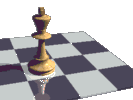 To
Lesson 1 To
Lesson 1
Checkmate
Evaluation:
 |
Individual Student Rubric |
Task |
1 |
2 |
3 |
4 |
Demonstrates
an understanding of the
rules of chess: |
Can successfully compete in a game of chess
against other students and online while following
all of the rules of chess. |
Can successfully compete in a game of chess
against other students and online while following most of the rules of chess. |
Can compete in a game of chess against
other students and online while following some of
the rules. |
Can compete in a game of chess against
other students and online but has difficulty following
many of
the rules. |
Uses chess
strategies: |
Can capture many of the opponent's chess pieces, including
those of high rank, without having own pieces captured. Can play
in such a way as to checkmate the opponent's king consistently . |
Can capture some of the opponent's chess pieces, including
some of high rank, without losing many of his own pieces. Can
achieve a checkmate some of the time. |
Can capture a few of the opponent's chess pieces, but
loses many of his own pieces. Can achieve a checkmate on
occasion.. |
Can capture a limited number of the opponent's chess pieces
but loses many of his own. Checkmate is usually against his
king. |
Records chess moves
using algebraic notation: |
Records chess moves in a journal using
algebraic notation. Annotates journal with strategies used and
strategies that should have been used.
|
Records chess moves in a journal using algebraic notation.
Annotates journal with some strategies used. |
Records some of the chess moves in a journal using algebraic
notation. Omits annotations of strategies used. |
Cannot record chess moves using algebraic notation. |
Explains chess
moves and strategies: |
Clearly details many strategies used in play and discusses
many options that could have been taken. |
Details some strategies used in play and discusses some
options that could have been taken. |
Records few strategies used in plays. Does not discuss other
strategies that may have been used in play. |
Cannot record strategies in a meaningful way. |
|
 To
Lesson 1 To
Lesson 1
Note: In addition to rubrics, students may be evaluated based on teacher
observation of the students playing chess, doing research, and working in
groups. In addition, feedback from the students and the journal writings would
also serve well as evaluative tools. |